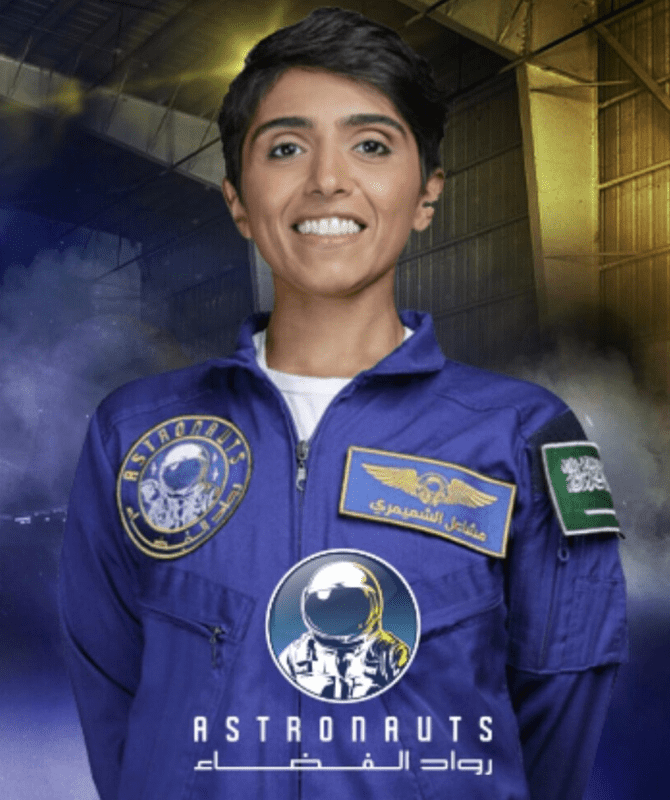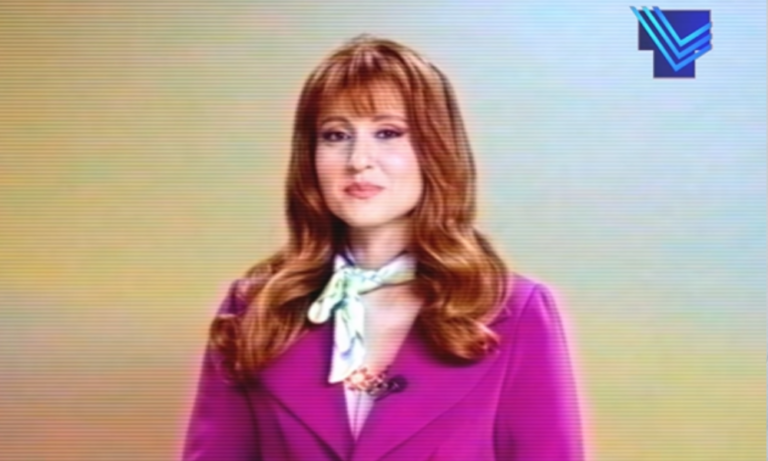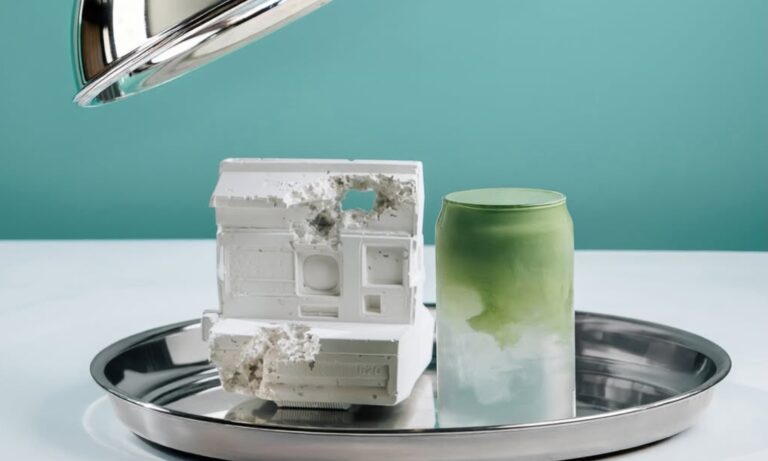The first aerospace engineer in the GCC, Mishaal Ashemimry wanted to reach for the stars and in order to get there; she needed a rocket, so she decided to build it herself and start her own company! Her fascination with space led her to become an aerospace engineer, a certified rescue diver and a certified commercial pilot with instrument rating.
Through her impressive journey she has changed perception on many levels from reaffirming gender equality, hard work and perseverance to get to where she is today.
She is part of the innovators who are making the journey into space more accessible and cost-effective building the first company to access the moon.
Thank you for taking the time tell us more. What moves you about space?
I am moved by space’s mystery. If we had to quantify what we know about our universe, it would account for 5%. So, there is much exploration that needs to happen on our end.
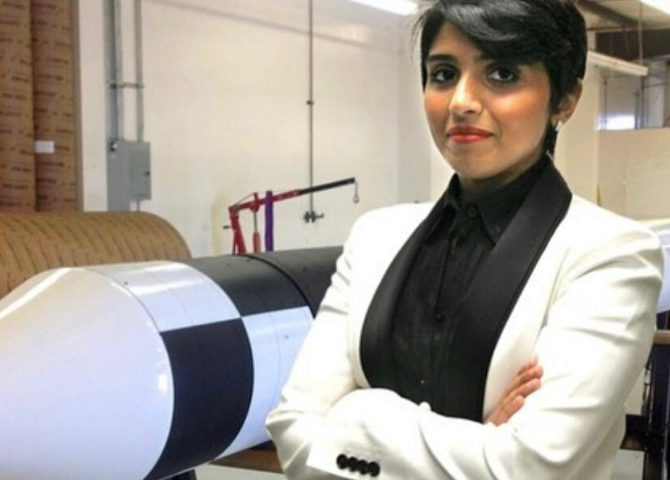
How was your experience working with NASA? And how did that lead to your starting your own company?
Following my two Bachelor of Science Degrees in Aerospace Engineering and Applied Mathematics, I pursued a Master of Science Degree in Aerospace Engineering. My research for my Master’s Degree was funded by NASA. Therefore, NASA paid for the research, tuition, and a stipend. Once completed, I published my research at the 43rd AIAA/ASME/SAE/ASEE Joint Propulsion Conference and Exhibit. My research and publication were on designing a novel grooved-ring reactor for nuclear thermal propulsion. In simple terms, we wanted to develop a nuclear rocket capable of sending humans to Mars. I learned significantly and enjoyed my work on this research project even though I got very little sleep. Following my Master’s Degree, I worked for Raytheon Missile Systems in Tucson, AZ for two years. While there, I conducted four wind tunnel tests and worked on twenty-two different rocket programs. Then in 2010, I founded MISHAAL Aerospace.
To preface how I got to starting my own business, let me describe the aerospace market at the time. The aerospace job market in 2010 was slowing down and many companies had several layoffs rather than hire events. So, when I left Raytheon it was difficult to find other jobs in the market. As a result, I was faced with either moping around and waiting until a job opening at some aerospace company became available or start my own. I was faced with either leading or following; I chose leading. Consequently, I created my own opportunity to start my own company. Naturally, I had some help, I am fortunate to have a strong support from my family and friends.
Many people may think this move is too high of a risk, especially in the field of aerospace. It is true, it is very high risk. However; it is better to have tried and failed than not have tried at all. Of course, trying and succeeding is the goal.
My company, MISHAAL Aerospace, specializes in launch vehicle development to send small satellites (<=500 kg) to Low Earth Orbit. We design, develop and launch our own line of rockets: The M-Rocket series. The M-Rocket series is the first generation of cost-effective space access vehicles. There are two main vehicles in the M line the M-SV (Suborbital Vehicle) and M-OV (Orbital Vehicle). The M-SV rocket is also used a booster in the M-OV. The M-SV is a hybrid rocket that we make entirely in-house and the static test we conducted on August 11, 2014 was to demonstrate our propulsion system and validate our design and manufacturing process.
The great news is the test was successful and our propulsion system preformed as expected. The success of this test brought tears of joy to my eyes, because it took blood, sweat, tears and a lot of hard work to get there. So, I thank god for that. Unfortunately, due to lack of funding and investor appetite in this field at that time, I had to put the company on hold.
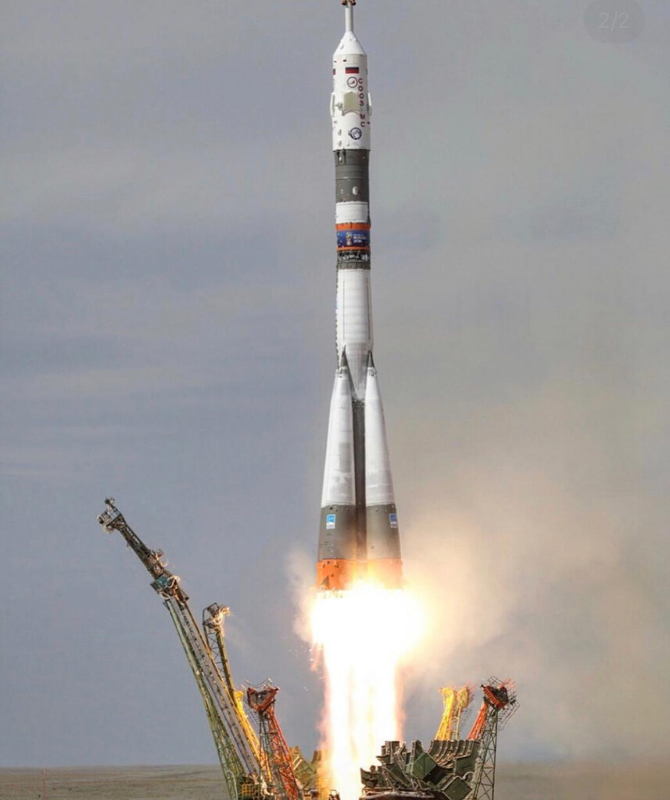
What advice would you share to someone who wants to start their own company?
I would encourage them to fully study their:
1. Market
2. Competitors
3. Technology (if applicable)
4. End-users or customers
You need to see a gap in the market that you can fulfil with a technology or solution that is more creative and cost-effective than your competitors, which appeals to your customers.
I suggest writing down the market gap, your solution, strategy and plan to execution in the form of a business plan. In the same document, highlight the costs and investment you need. I would have a separate document that lists potential investors and have a slide deck to present your idea to them and attract them to your market gap solution. I also suggest you have a back- up plan in case no one puts money. Usually if you put your own money and have skin in the game, investors will be intrigued and perhaps invest with you. Never rely on one investor, because financial markets can change and investors may be unable to continue with you, therefore; always have a pool of investors ready and able to join.
Lastly, do not be afraid to fail. I always say: “failure is the seed from which success grows.”
Gender equality is an important factor in the movement which you are creating. Tell us more about your experience and how long it took you to prove yourself as a woman in your industry?
Most fields, and more specifically engineering, are male-dominated fields. While there are many supportive and inclusive males in the industry, unfortunately, every woman will encounter some resistance and jealousy by a male colleague. I recall when I was working on one of the rockets, I entered a design review meeting, which had many senior engineers, I noticed they immediately dismissed me as a woman and as a young person. These sorts of looks were just another day for me as I have really thick skin. As soon as it was my turn to discuss my design portion and predictive analysis on the rocket, all the senior male members in the room looked like they got slapped in the face (laughs). It felt good, because it made them realize that science and the merit of your capability transcends their views on women and age,and it shook them. From that day on, those who looked at me initially that way changed their looks to those of respect and admiration.
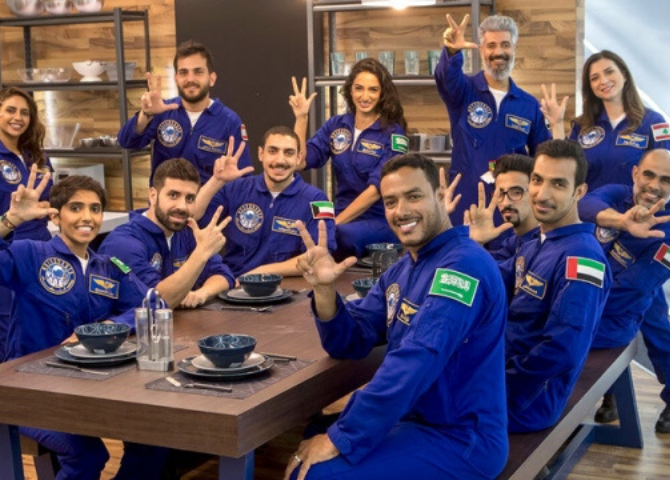
Of course, there will always be that one person, who cannot get over their emotional issues and will always attempt to sabotage your work or delay his portion which you need, in an attempt to delay your delivery. I had this one gentleman who seriously had either jealousy or envy or some form of emotional distress that had nothing to do with me. He delayed the delivery of his work to me, which I needed to produce my deliverables and he did so on purpose. I managed without it and had evidence of several emails requesting his data, which he sent one hour before our meeting and somehow, I managed to finish my work within that hour, as I anticipated his dirty move. In addition, this same person showed up late to a meeting and began poking holes in my design solutions not in the spirit of teamwork, but to undermine my science.
To his dismay, I already covered what he was addressing before he showed up and our project manager got very irritated by his questions and snapped at him saying: “she already addressed all of this and you would have known had you come in to the meeting on time.” This demonstrates that while you will have these weirdos, you will have many more people that are supportive and eager for you to succeed. As an example of the supportive ones, many project managers would request me to join their projects by name given my capabilities and work-ethic.
In conclusion, you will find yourself, as a woman, having to work three times as hard to get recognized for the same thing a male does.
This is just part of the game, so don’t take it personally, eventually when we can dominate these fields, we can make the males work 4 times as hard (I state this with humour of course). In addition, like any other field sometimes it can get a little competitive, so just roll with it.
You are an avid believer in self-development. Tell us more about how you became so focused and disciplined?
I think my life experiences and the difficulties I went through early on in my life have produced the discipline I have. In addition, I enjoy the feeling you get when you complete a task, and this feeling drives my focus. It’s almost like work hard and get rewarded type of feeling. Moreover, I sometimes give myself little gifts when I finish tasks I am really dreading. For example, I allow myself time with friends if I finished tasks I have been dreading. As such, I look forward to completing it to get my friend time or whatever gift I promised myself.
You are very generous with your advice in your interesting YouTube series. Tell us more about your book review episodes? What compelled you to start them?
I decided to have the book episode for two reasons: First, my followers wanted to know what books I read and second, my sister Sara insisted I make this episode. Given that the pandemic has had a negative outcome financially, emotionally, and physically on many of us, I figured it is a good time to lose yourself in books. If people enjoy what they read, they escape their pains for a little bit and learn something new or enjoy a trip through their imagination sparked by a good writer.
In doing so, you not only escape your pain you also rejuvenate your spirit and what was once a negative feeling becomes a feeling of hope and positivity. This positivity will attract more positive things to happen to you as you are uplifted by what you are reading. So, in the end the outcome will always be good and positive.
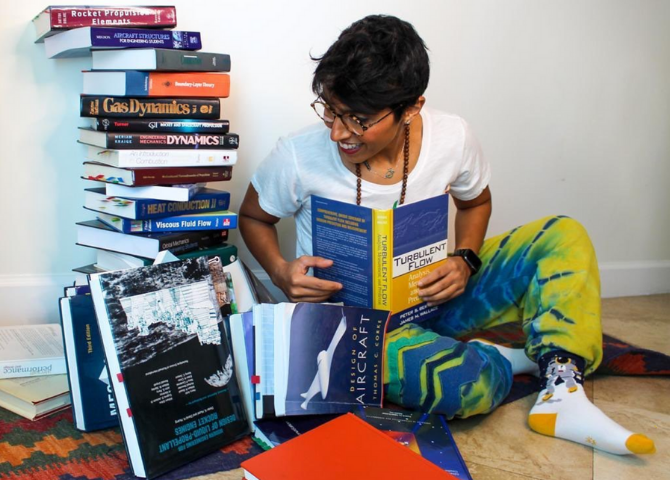
You built a rocket and started your own company doing it. What’s next for you?
I would like to be part of space in the GCC and enable opportunities for youth within this field. In addition, I want us, in the GCC, to participate in space related exploration and development not only space probes and satellites, but also enable launching GCC made rockets from GCC land for space exploration.
Moreover, I want to create and enable a thriving private space industry within the GCC that pushes the envelope, not only in space related sciences but also to participate and develop solutions for us on earth through labs in space. Lastly, I would like to go to space as an astronaut.
What has the current coronavirus outbreak taught you the most? What will be the most important experience you feel has shaped your perspective in the hard times we live in?
The loss of the freedom to surround yourself with friends and loved ones has taught me that every moment you get with them must be cherished. It is true what they say, you never really know the value of someone or something unless you have lost them/it. Spending time with friends was taken from us and so we tend to sit and reflect on this loss and how much we eagerly await this pandemic to be over so we can resume our interactions and enjoy our time together. Additionally, I learned that time is so precious and so you need to choose wisely what you want to spend your time doing and who you choose to spend your time with.
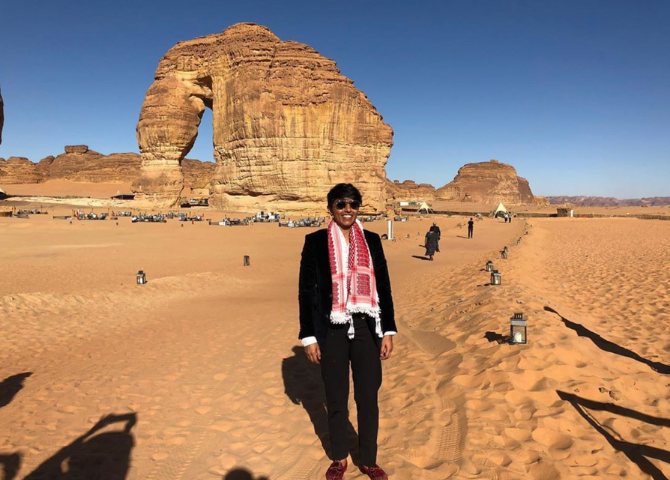
Also, I learned that I can actually cook 3 meals a day on my own and make pretty decent food (laughs). I also learned that you not only have to worry about staying healthy and safe for yourself, you also must think of others by sacrificing seeing them in case you are infected.
There are some obvious changes that will remain after this pandemic is over, such as:
1. Companies reducing their overhead as they realize that having a physical office is not necessary
2. Shaking hands will take some time to come back
3. All travel and lodging will implement cleaning protocols that will remain post-pandemic
4. Some companies will implement higher margins for “Things can happen factor”. In my company, I had it as an entry item with the acronym SCHF and gave it 20% of revenue…
5. Most of us will be germaphobes for a while
6. The potential for agoraphobia will increase among some people
7. The global tourism industry will see a very strong hit, but local tourism will increase
8. Our environment will continue to benefit and has benefited from reduced travel and human footprint
9. Big events will shift to a more digital presence, which event hosts will find to be more cost-effective
10. Some people will connect more strongly with their families while others will be breaking up as a family
11. More and more people are becoming more self-sufficient by learning to cook, fix and be innovative around their homes
Interestingly enough though, this pandemic has showcased how, we as humans, regardless of our ethnicity, religion, politics, or ideologies, have responded very similarly to this pandemic on a human level. We all grieved! We all missed our families and friends! We all attempted to connect with people we haven’t spoken to in a while! We all cried at the loss of human lives! We all shared a common pain! As such, in some way with all our difference we were brought together by our predicament.
What is style to you?
I believe style is a reflection of yourself and how you feel. For example, I am a practical person, as such, I value my professionalism and comfort. To that end, I usually dress up to reflect that. I prefer suits or business casual most of the time. When I dress down, I let the environment dictate what I should wear.
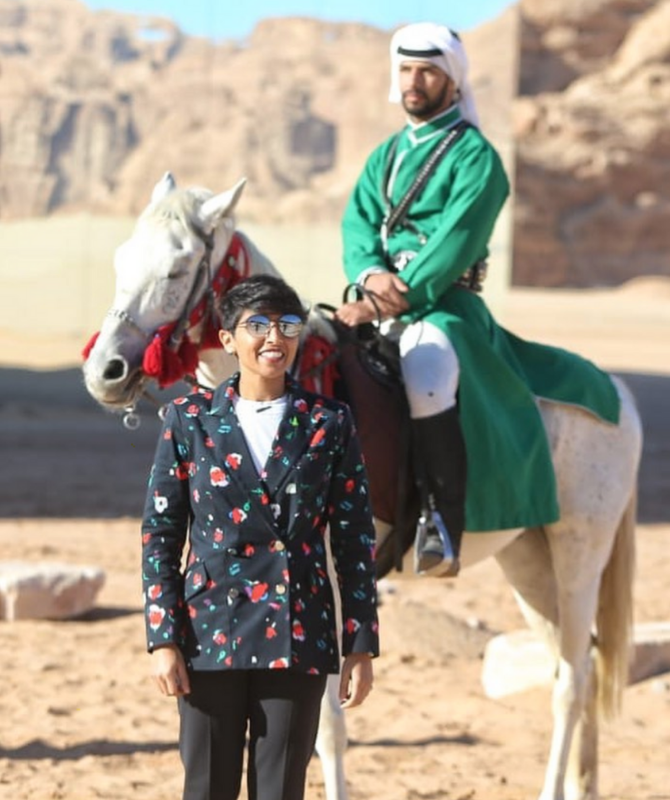
Who is your Arab role model?
HRH Prince Sultan bin Salman. I recall when I was a kid, and the school took us on a field trip to the Science Museum in Jeddah.
They had a space exhibit there at the time and I was elated, because I found an Arab and a Saudi who actually went to space. I found someone like me, who shares my dream and ambition.
I went home and told my mom all about it. How His Highness went on the space shuttle discovery and deployed ARABSAT-1B and how he conducted an oil/water experiment in microgravity. I remember saying to my mom, if I were him, I would request an extension to stay in space for a little longer. A week is not enough for me mama!
I had the honour and pleasure to meet His Highness and I was so amazed at his warmth, kindness, and humility. I was delighted that we share common interests in space and flying. I would love the opportunity to fly with him and learn from his experience. It will happen inshallah in time. He actually invited me to fly with him on his airplane, and I am very enthusiastic and eager to do so.
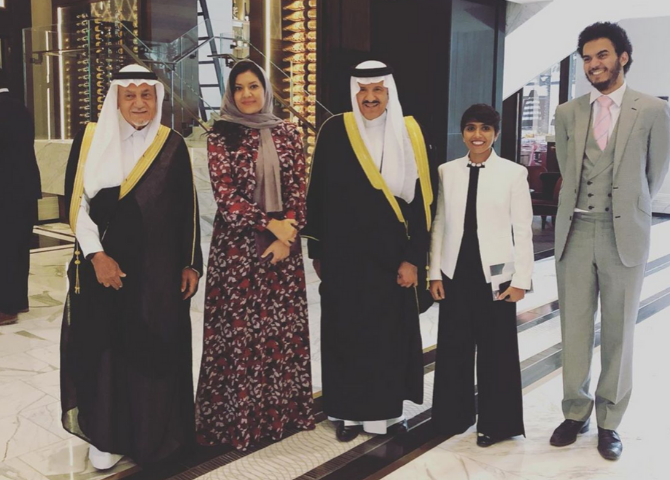
Less is more or more is more?
I think less is more because simplicity is the key to everything. If you can explain something concisely you will succeed, if you are unable to it means you need to review what you are trying to say. If you write, it is best to get to the point and paint your picture lucidly and concisely.
The only time I think more is more, is if are using the scientific method to demonstrate the validity of your theory. Then in that case, the more cases your theory can predict the more encompassing your theory is. In addition, if you code, I recommend coding more generically so your code can take as many cases as it can. In doing so, your code becomes more robust. In that case the more cases your code can handle the more capable it is.
Now, read Hatem Alakeel’s exclusive roster of interesting interviews in his Gems of Arabia column here.
